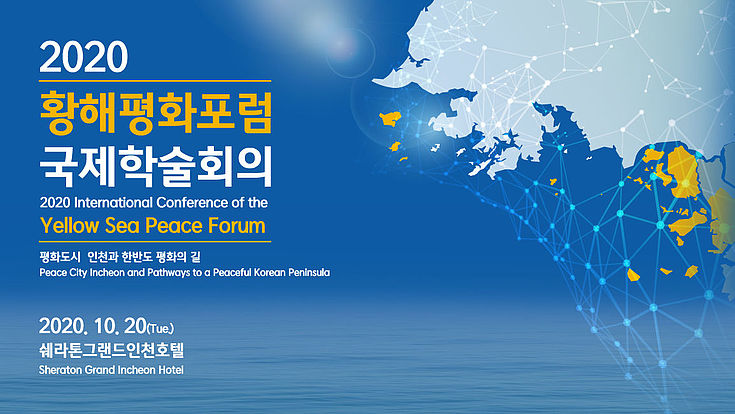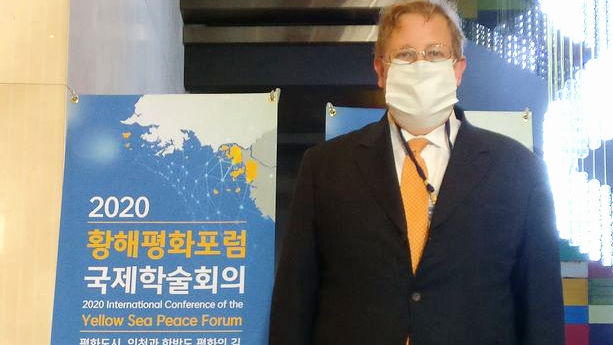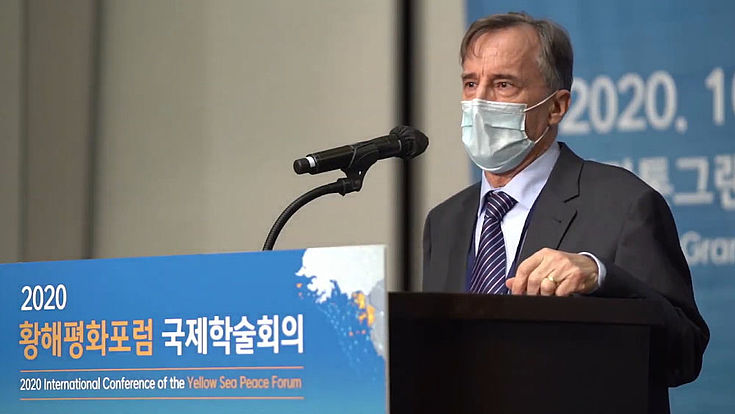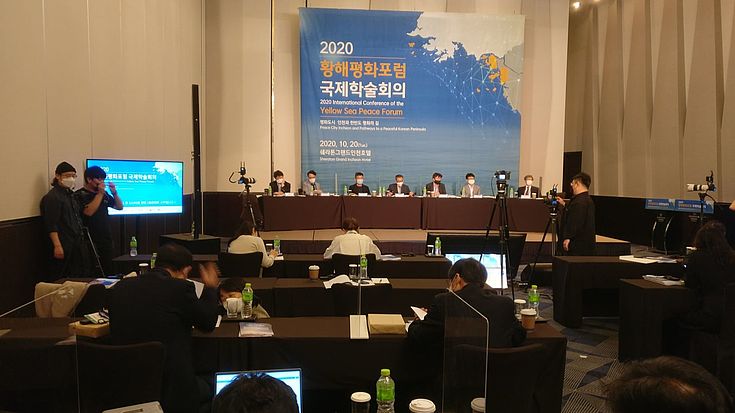Conference
Impressions from Yellow Sea Peace Forum 2020

Three South Korean provinces border North Korea: Gangwon province in the East, Gyeonggi province, and Incheon city with the far outlying islands in the Yellow Sea in the West. This Western part of the border saw some of the most tense and dangerous clashes, like naval battles, defections over the sea, artillery shelling of islands etc. No wonder that in particular Incheon city has a heightened interest in pacifying the border. Before this background, HSF Korea representative Dr Bernahrd Seliger took part in 2020 Yellow Sea Peace Forum.
Discussing energy cooperation as well as the lessons from other divided countries. Prof. Lee Gap-Young of Incheon National University led the session on energy cooperation. Kang Hee-Chon of Incheon National University, Kim Hyo-Sun of the Presidential Committee on Northern Economic Cooperation and Ryu Kwon-Hong of Wonkwang University looked into the role of Incheon in Northeast Asian energy trade and the potential for a Northeast Asia Gas Network Initiative. Kim Hyun-Tae of the Korean Institute for Energy Evaluation and Planning, Lee Heung-Bok of Hyundai Development Corp. and Nikita Kharin of the Russian Embassy to Korea discussed the papers.

The second session brought together three different country perspectives, namely Russian-North Korean cooperation, divided Germany and Vietnam’s cooperation in the South China Sea. The session was moderated by former Ambassador Kwon Tae-Myeon, who currently works as director at the Incheon International Development Cooperation Center at Incheon National University. Prof. Oleg Kiriyanov of Moscow State University discussed the Russian experience of cooperation in Rason with North Korea. Bernhard Seliger of Hanns-Seidel-Foundation Korea compared the German experience of cooperation during division with the Korean case. He pointed out the importance of private cooperation, unregulated by the state, and also of consistent long-term policies. Finally, Tran Truong Thuy of the Vietnamese Embassy to Korea gave an introduction to Vietnam’s manifold diplomatic initiatives in the South China Sea to contribute to a peaceful solution in this entangled region of divergent national interests and sea borders. The papers were discussed by Lee Su Seok of the Institute for National Security Strategy, Kim Young-Yoon of the Korean Logistics Forum, a researcher with profound knowledge of Germany, and Lee Hyuntai of Incheon National University.

The opening ceremony brought together the President of the Incheon Institute, which organized the conference for Incheon City, Lee Yong Shik, the mayor of Incheon, Park Nam-Chun, the Vice Minister for Unification, Suh Ho, the Secretary-General of the National Unification Advisory Council, Lee Seng-Hwan, as well as Stephen Linton of the Eugene Bell Foundation, who in a keynote speech spoke about his experience of helping North Koreans affected by the humanitarian crisis in the country and how it contributes to understanding and peace.
The third session was devoted to the role of media in creating peace. Takeshi Kamiya of Asahi Shinbum, Choi Sang-Hun of the New York Times, Kwon Young-Seok, Director of Yonhap Unification Media Research Institute, Nam Chang-Sup of Incheon Ilbo and Mok Dong-Hoon of Kyeongin Ilbo discussed the role of media in a roundtable moderated by Kim Jin-Ho of Kyunghyang Shinmun. The absence of any representative of the larger conservative media might have contributed to a relatively uniform view in the discussion.

After all the preparatory talks, the final session took the conference to the ultimate goal of Incheon, namely inter-Korean cooperation in waters near the Yellow Sea border with North Korea and the role of Incheon, moderated by Prof. Lee Guan-Hong of Inha University. Roland Wilson, Professor at George Mason University Korea and a good partner of HSF Korea focusing on conflict resolution management discussed how to transform challenges in the West Sea to opportunities. Nam Jungho of the Korean Maritime Institute looked into transboundary cooperation in the West Sea and Hwang Eun-Ju of the National Nature Trust proposed measures to utilize the marine ecosystem in waters near the West Sea to create a peace zone. The discussion was led by Kwon So-Young of George Mason University, Kim Dong-Sung of the Gyeonggi Research Institute, Park Jeongwoon of Green Incheon and Dean Oullette of the Institute for Far Eastern Studies at Kyungnam University.
Certainly, a conference alone does not bring peace and a lot of wishful thinking does not yet make a good strategy. But to talk across borders, e.g. politicians and diplomats to academics of NGO representatives, might still be an important contribution to an important cause. Without a hard-nosed analysis of North Korean interests and strategies, there will be no successful peace policy. But without talking about peace and offering peace, neither…
The Yellow Sea Peace Conference was also covered by several newspapers (all only in Korean):
http://www.incheonilbo.com/news/articleView.html…
http://www.kihoilbo.co.kr/news/articleView.html?idxno=892538
https://www.yna.co.kr/view/AKR20201020139400065
